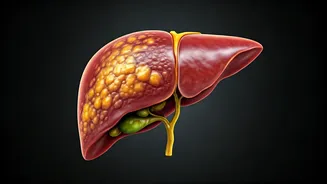Initial Weight Impact
Even a minor rise in body weight can have a subtle yet substantial effect on your overall health. Over time, this can put a strain on essential organs.
Excess fat, particularly the visceral fat that accumulates around the abdomen, is closely linked to serious health conditions like type 2 diabetes, heart disease, and liver damage, as well as kidney stress and gut imbalances. People frequently dismiss minor weight gain; however, it can trigger insulin resistance, high blood pressure, and chronic inflammation, all of which elevate the risk of long-term health issues. It is important to monitor weight, along with waist size, body mass index (BMI), and body composition, to gain a clearer view of organ health. Maintaining a healthy weight through a balanced diet, exercise, and lifestyle adjustments is essential for protecting vital organs and preventing serious metabolic diseases.
BMI and its role
Body Mass Index (BMI) is a widely used method for assessing whether a person's weight falls within a healthy range. It categorizes individuals as underweight, healthy weight, overweight, or obese. While small weight gains can be easily dismissed, particularly after festive seasons, even a few extra kilograms can lead to considerable health consequences. These include increased risk of diabetes, high blood pressure, heart disease, cholesterol imbalance, and joint strain. Exceeding a healthy BMI increases stress on major organs. This initiates a chain reaction that affects the heart, liver, kidneys, and digestive system. This internal stress can impair immune function, reduce stamina, and negatively influence sleep quality, mood, and hormonal balance over time. Weight gain, even if mild, can gradually compromise overall metabolic health and energy levels.
Diabetes, Heart Risks
Excess fat, particularly visceral fat that gathers around the belly, interferes with the body's insulin response, resulting in a condition known as insulin resistance. This makes it difficult to control blood sugar levels, thereby increasing the risk of type 2 diabetes. High BMI or a large waistline is linked to a significant portion of heart disease deaths. Even slight weight increases should not be ignored, as they can directly contribute to life-threatening conditions. Carrying extra weight forces the heart and blood vessels to work harder. Fat accumulation around the abdomen raises blood pressure and cholesterol, making the heart more vulnerable to damage. Over time, this extra workload can lead to arterial stiffness, plaque formation, and chronic inflammation, increasing the risk of heart attacks, strokes, and heart failure. Maintaining a healthy weight is one of the most effective ways to reduce cardiovascular risk.
Impact on Internal Organs
The dangers of extra weight extend beyond the heart, with visceral fat surrounding internal organs being especially harmful. For the liver, fat accumulation can lead to non-alcoholic fatty liver disease (NAFLD), causing swelling, scarring, and impaired liver function. For the kidneys, extra body fat increases the workload, which can lead to chronic kidney disease over time. Additionally, weight gain disrupts the balance of gut bacteria, resulting in inflammation, poor digestion, bloating, and impaired nutrient absorption. It's crucial not to ignore even modest weight gain, as it can trigger widespread organ dysfunction over time.
Metabolic Cascade Effect
Excess weight triggers a metabolic cascade that has various effects. Firstly, insulin resistance develops, increasing the risk of type 2 diabetes. Secondly, cholesterol and blood pressure levels fluctuate, increasing cardiovascular strain. Finally, chronic inflammation becomes persistent, negatively affecting multiple organs. Extra weight doesn’t just add physical bulk; it sets off a chain of metabolic events that can have far-reaching consequences. Monitoring weight and adopting healthy lifestyle choices are crucial to safeguarding your health and ensuring that your organs function properly.















